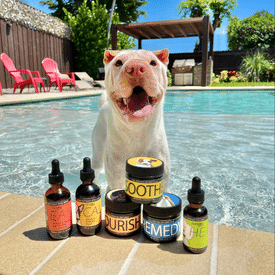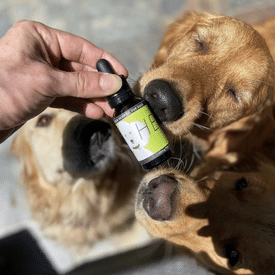Is Turmeric Safe for Dogs?

Is Turmeric safe for dogs? Yes! When it comes to holistic healing, we are often tempted to head to our nearest all-natural store to look for cure-alls. But, you may already have a key ingredient to give your pet a better life right inside of your spice cabinet: Turmeric! There are many benefits to turmeric for dogs and pets, let’s get into it!
Table of Contents
What is Turmeric? What is Curcumin?
Curcuma longa, commonly referred to as turmeric, is a flowering plant originating from the Indian subcontinent and Southeast Asia. Turmeric shares botanical ties with ginger (Zingiberaceae) and, like ginger, its primary focus lies in the utilization of its roots.
Is Curcumin The Same As Turmeric?
The roots of the turmeric plant are teeming with bioactive compounds, with the most extensively researched group being the curcuminoids. Among these curcuminoids, particular attention is often directed towards a singular compound known as curcumin. Not only does curcumin impart a vibrant orange hue, but it also offers a diverse range of health benefits!
Benefits of Turmeric For Dogs

- Antioxidant
- Anti-inflammatory
- Anti-viral
- Antibacterial
- Antifungal
- Anticancer
- Diabetes
- Allergies
- Arthritis
- Alzheimer’s disease
Turmeric For Osteoarthritis
As the body digests turmeric root, curcumin (a compound inside the root), enters the bloodstream. Curcumin fights inflammation in the body, reducing the effects of osteoarthritis at the cellular level. A study found that ingredients in turmeric, like curcumin, are as effective in treating osteoarthritis as many conventional pharmaceutical medications, and the ingredients in turmeric caused fewer negative side effects. The benefits of turmeric go beyond just stopping the pain of arthritis.
Turmeric/Curcumin can also slow the progression of arthritis in humans and animals, according to a 2016 study. These benefits extend to dogs, enabling you to give your pet a better life, naturally, right at home.
Turmeric For Cancer
When it comes to cancer, curcumin is known to be a natural apoptogen. This means there is reason to believe it naturally kills off cancer cells while keeping the good cells.
A study published in the Journal of Veterinary and Comparative Oncology discovered and confirmed curcumin’s solid anti-cancer qualities. Researchers found the movement of tumor cells was prevented with the use of curcumin resulting in stability. Another study, published by BMC Veterinary Research, found curcumin useful in treating a variety of diseases and conditions due to its ability to bind to proteins on a cellular level.
Turmeric For Dementia
Dogs try to hide their pain and confusion for as long as possible, it’s instinctive. They don’t want to be seen as the ‘weak link’ in the pack. So, it may seem like dementia comes out of nowhere. Canine Cognitive Dysfunction is basically like ‘doggy Alzheimers.’
Turmeric has been found to decrease the risk of developing dementia and/or prevent further mental decline from occurring. Studies show those who incorporate turmeric into their diet are less likely to develop mental decline.
What Else Can Turmeric Do For Dogs?
Turmeric is a root and is part of the ginger family. It has numerous health benefits for dogs and works synergistically with other holistic remedies. According to a study conducted at Baylor University, turmeric has been shown to:
- Slow the progression of arthritis and treat arthritis pain
- Alleviate gastrointestinal disorders, including irritable bowel syndrome (IBS), inflammatory bowel disease, and ulcerative colitis
- Act as a powerful antioxidant, which can fight “free radicals” in your pet’s blood from toxins, prolonging the pet’s life and slowing degeneration
- Fight and prevent cancer and tumors
- Prevent dementia
- Reduce epilepsy and seizures
- Promote heart health and liver function
- Relieve allergies
- Promote positive mental health
A recent Comparative Study of Classical and Alternative Therapy in Dogs with Allergies showed that turmeric significantly alleviates the symptoms of food allergies and inhibits the levels of IgE and IgG1, which significantly reduce the symptoms of food allergies in dogs.
How Do I Give My Dog Turmeric?
Turmeric can be provided in several ways; the organic root, essential oils, or in powder form.
Get To The Root
Angela recommends between 1 tsp to 1 tbsp grated organic turmeric root depending on your dog’s size. The raw, unprocessed root is the most therapeutic form of turmeric. Straight from the Earth’s ground is the best way to go.
Combining Turmeric and CBD
Essential oils are the next best method to provide the therapeutic properties of turmeric and curcumin. For example, turmeric combined with CBD oil (for example, our EASE tincture) can pack a serious punch in preventing joint damage and pain, and the complimentary ingredients in both will work to boost the result. That’s why we include turmeric in our EASE tincture for aches and pains, arthritis, and allergies.
B-Caryophyllene is a terpene found in both cannabis and curcumin. It’s known to work as a receptor to reduce chronic pain, nephrotoxicity (toxins in the kidneys), and neuropathy.
Turmeric Powder for Dogs
If your dog isn’t for the organic root or essential oils, you can try providing turmeric in powder form. Once it’s in powder form, you can create Golden Paste. The name says it all. This creation is truly golden (both in color and in use). Simply combine four ingredients: turmeric, black pepper, coconut oil, and water. Then, cook it through the directions below. 
A good starting dose for golden powder is about ¼ teaspoon two to three times per day added to your dog’s food.
*Note: A raw, unprocessed form will have more therapeutic value.
Can Dogs Overdose on Turmeric?
Side effects of Turmeric
You should always check with your holistic vet before adding a supplement into your pet’s diet.
While turmeric is safe for most dogs, it is a warming spice, meaning that it can cause your pet to warm up. If you have a dog that is always cold, that is great news. But, if your dog is constantly overheating, you may need to let your vet know so that they can help you decide if turmeric is the best option. However, the warm sensation does not usually last long, and usually only happens when you use a large amount of turmeric.
Turmeric also has an anti-coagulant effect, which is great for many people and pets as it helps prevent heart attacks and cardiac disease. However, for animals and people with bleeding diseases or clotting issues, it’s not so great. So, if your pet has a bleeding disease like thrombocytopenia, Immune-Mediated Hemolytic Anemia (IMHA), or Disseminated Intravascular Coagulation (DIC), it’s best to avoid using turmeric.
Turmeric for Inflammation
Though turmeric is known for its warming properties, it is also a great tool for reducing inflammation throughout the body and may have a pro-regulatory effect on temperature nonetheless.
You should also use caution with turmeric if your dog has kidney stones or diabetes. Your dog may also become constipated when you first begin using turmeric, because it acts as a binding agent. You should start your pet on turmeric slowly so that you can gauge their body’s reaction.
All pets are different, and all pets have different reactions and reaction times to new treatments. Make sure to watch your pet closely for the first week or so of using any new supplement, including turmeric.
Curcumin for Dogs
Curcumin has tremendous potential to improve dog health. The ability to kill cancer cells while keeping the good, to stop angiogenesis (cancer building its own blood supply), to slow the division of cancer cells, and to reduce the spread of tumors make it one of the top compounds on the ‘good’ list.
To recap, not only does curcumin help with cancer, but it’s also been proven to help with other conditions like osteoarthritis, dementia, and Alzheimer’s, among others. Combined with CBD, this could result in your dog living a more full, happier, healthier life. That’s why we include turmeric in our EASE tincture for aches and pains, arthritis, and allergies.
Keep in mind, that the best way to utilize turmeric isn’t through the essential oils or golden paste, though. The most therapeutic form is raw, unprocessed, and untouched. No cooking, baking, or heating up of any kind other than from the Earth’s sun. The second best method is via essential oils. The powder method is the final form for dogs who haven’t accepted the first two methods.















